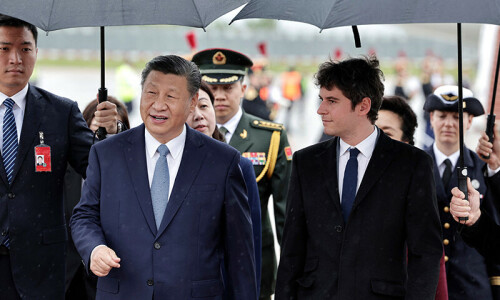STELLA, the name meaning star, shines more than ever this Christmas. Her rented apartment in Junejo Town — one of Karachi’s few Christian-majority neighbourhoods — expects to host more guests than it can accommodate. The reason is not Yuletide alone. Today, Stella celebrates recognition for becoming the first Pakistani policewoman to receive the Quaid-i-Azam Police Medal (or QPM), an award of gallantry with which she was decorated this month.
She feels lucky in receiving the award at a ceremony at Governor House, an occasion that coincided with the approaching Christmas celebrations. And it sounds all good, very simple and straightforward until one recognises the details.
Stella Sadiq and I meet at the main entrance to Hazrat Abdullah Shah Ghazi’s shrine. Uniformed and carrying her two-year-old son, Stella smiles to receive me and the photographer accompanying me.
“Here I stopped him,” she recalls, tightening her grip around her son Manahim. “And that was the place where I was hit. I am still posted here [at the shrine] for security duty. I tried to forget those moments but now feel proud that I was there to prove myself ... my courage ... my honesty and my decision to join the police force.”
On the evening of Dec 8, Stella was decorated with the QPM in a not much-publicised ceremony at Governor House. Very few know that this police constable saved the lives of many in 2010. That day, on the evening of Oct 7, 2010, about half an hour after sunset when the shrine was jam-packed, Stella was waiting for her elder brother outside the main entrance after having completed her duty hours. A private security guard at the main entrance called out to her, pointing towards a man he was obstructing and shouted: “Madam, he is not allowing a body search.” Despite having completed her duty hours, Stella returned, spotting the teenage boy clad in a dark shawl who was trying to enter the shrine evading the mandatory body search. The newly recruited police constable in her early 20s lost no time in sensing the danger in the offing.
“He was a young boy,” she recalls as we sit on the lawn of the shrine that has by now got a makeover. Stella remembers precisely the spots where events took place that deadly day.
“I walked up to him and asked him what his problem was,” she says. “Why was he not cooperating? I found that he was in a hurry, confused and desperate. As he pushed at one of the private guards, I grabbed him by the collar, overpowered both his hands, kicked him in the abdomen, and pushed him away with all the force I could muster.” Finding himself trapped and helpless, the young boy — who turned out to be a suicide bomber — set off the explosives, injuring four people.
“It was a huge explosion and people started running everywhere,” Stella says. “I had almost lost my senses, but I controlled my nerves. I ran into the shrine’s premises to report the situation to my seniors when another suicide bomber, who had managed to sneak in, exploded himself on the stairs leading to the premises of the mausoleum. I don’t remember what happened after that second explosion.”
Stella was injured in the second bomb attack that killed eight people and left over 50 others wounded. She was treated at the Jinnah Postgraduate Medical Centre (JPMC) for 10 days. Yet her name was barely highlighted by police authorities after the incident, and over the past eight years.
This impression intensified recently when a female officer spearheaded a team of law enforcers against militants who attacked the Chinese consulate in Karachi, winning praise from the Sindh police inspector-general, the foreign minister, and the chief minister. In the case of Stella, however, it took almost eight years for her courageousness to be recognised. She saved hundreds of lives on that Oct 2010 evening.
Going through the stories of these two policewomen, I am haunted by a question: is there discrimination in the service cadre or is it more a matter of pick and choose for the authorities than performance to praise someone? Stella deserves much more than she has received — and what she has received is merely a medal. “The then chief minister, Syed Qaim Ali Shah, came to see me the very next day [after the bombing] at the JPMC,” she recalls. “He said nothing much, just asked about my health, offered a few words of praise, and left an envelope with a bouquet. It held Rs5,000 as a reward.”
Published in Dawn, December 25th, 2018
















































Dear visitor, the comments section is undergoing an overhaul and will return soon.